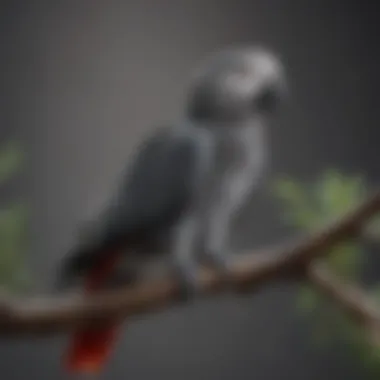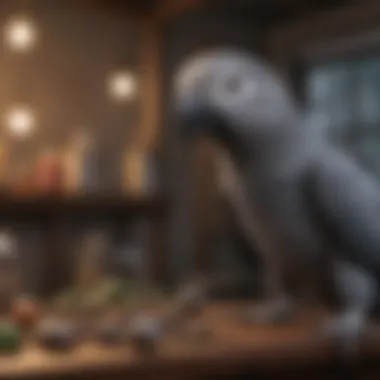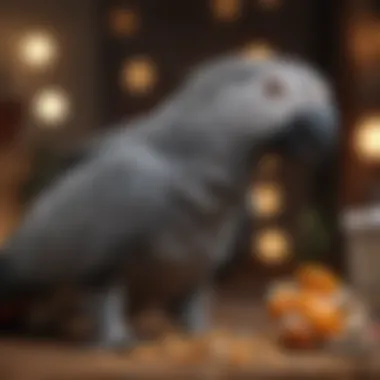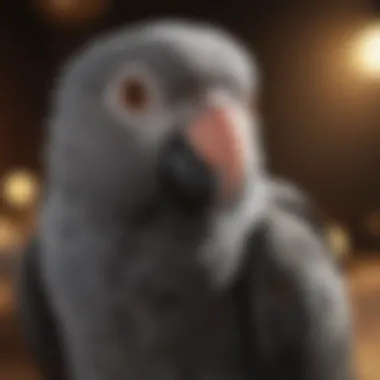Understanding the Financial Commitment of African Grey Parrots


Intro
Acquiring an African Grey parrot involves multiple financial considerations. While the initial purchase price may seem manageable, ongoing costs quickly become significant. Understanding these expenses prepares potential owners for responsible pet ownership. This section will provide insights into the costs associated with African Grey parrots, assisting readers in making informed decisions about welcoming this intelligent bird into their lives.
Understanding Your Pet
African Grey parrots are renowned for their remarkable cognitive abilities and social nature. Understanding their needs is critical for successful ownership.
Pet Behavior Basics
These birds are known for being highly social and requiring regular interaction. They thrive in environments where they feel part of the family. Left alone for extended periods, they may develop behavioral problems like feather plucking or excessive screaming.
Common Breed Characteristics
African Grey parrots exhibit unique traits, such as their distinct grey feathers, bright red tails, and impressive vocal skills. Their intelligence sets them apart; they can learn an extensive vocabulary and mimic various sounds, making interaction with them enjoyable but demanding.
Species-Specific Needs
These parrots require mental stimulation and physical engagement. Enrichment activities such as puzzle toys or foraging games are essential. Their diet must include a blend of high-quality pellets, fresh fruits, and vegetables to meet their nutritional requirements.
Pet Care and Maintenance
Owning an African Grey is not just an initial monetary investment, but an ongoing financial commitment as well.
Feeding Guidelines
Quality food is pivotal. Daily feeding of a balanced diet helps prevent health issues. Aim to provide a mix of pellets, fresh produce, and occasional seed treats. It's important to avoid unhealthy foods like chocolate and avocado.
Grooming Essentials
Grooming helps to maintain a parrot's health and appearance. Regular nail trims and occasional baths are necessary to keep them comfortable. Birds might also need their wings trimmed for safety, especially if they are not fully flight-trained.
Hygiene Practices
Maintaining cleanliness in their living space is essential. Regularly change their bedding and clean perches and toys to prevent illnesses. This vigilance minimizes the chances of infections and other health issues.
Training and Development
Successful ownership of an African Grey parrot requires training and consistent routines.
Basic Commands and Skills
Teaching basic commands such as
Overview of African Grey Parrots
Understanding African Grey parrots is essential for anyone considering them as pets. Their unique attributes and charm make them an intriguing choice. This section focuses on the defining characteristics of these birds and their popularity as pets. Recognizing these elements aids potential bird owners in assessing the responsibilities and commitments associated with adopting such a remarkable creature.
Characteristics of African Grey Parrots
African Grey parrots are known for several standout features. One of the most notable attributes is their intelligence. They are often regarded as one of the most intelligent bird species, capable of learning an impressive vocabulary of words and phrases. Their cognitive skills allow them to solve problems and engage with their human companions in meaningful ways.


In addition to their intelligence, these parrots are recognized for their striking physical appearance. They typically have a grey plumage, red tail feathers, and a distinctive, expressive beak. Their size generally ranges from about 12 to 14 inches in length, making them a medium-sized bird. Many owners appreciate their engaging personalities. They can form strong bonds with their humans and often display playful behavior, adding a lively element to any household.
Another important factor is their vocal abilities. African Grey parrots are well-known for their mimicking skills. They can imitate not just human speech but also various sounds in their environment. This talent for mimicry can lead to hours of entertainment for their owners, but it also calls for a commitment to social interaction. These birds thrive on human companionship and can become emotionally attached individuals, requiring attention and stimulation.
Popularity as Pets
The popularity of African Grey parrots as pets has grown significantly in recent decades. Several factors contribute to this trend. First, their intelligence and ability to communicate effectively create an appealing dynamic between the bird and its owner. Many people enjoy having a pet that can engage them in conversation and respond to various stimuli in the home.
Secondly, their social nature attracts families and individuals who seek companionship. African Greys are typically affectionate, which can enhance their appeal as family pets. Many parents appreciate their interactive qualities, believing it can provide children with a learning opportunity about responsibility and care for living beings.
While the popularity is evident, potential owners should consider several factors before committing. Understanding the time, energy, and financial resources required to care for an African Grey parrot is crucial. These birds can live for decades, which signifies a long-term commitment that must not be taken lightly. It is important to weigh the appeal of owning an African Grey against the responsibilities that come with their care.
Initial Purchase Price
The initial purchase price is a crucial factor when considering bringing an African Grey parrot into your home. Understanding this cost sets the stage for all future financial commitments. From the outset, potential owners should realize that this is not merely a one-time expense. The cost of acquiring an African Grey can greatly influence the decision-making process and the kind of care one is prepared to provide.
Where to Buy African Grey Parrots
When looking to purchase an African Grey parrot, several sources are available. The most recommended option is a reputable breeder. Breeders typically offer well-socialized birds, which are critical for the pet's emotional well-being. You can often find breeders through avian specialty websites or local bird clubs. Another option is adoption from animal shelters or rescue organizations. This path not only gives a parrot a second chance but may also reduce the financial burden associated with purchasing.
Pet stores commonly sell African Grey parrots, though caution is advised. Not all pet stores maintain the same standards of care or may lack necessary health documentation. Always investigate the store's reputation before making a purchase.
Average Price Range
The average price of an African Grey parrot usually falls between $1,000 and $3,500. The exact figure can vary based on factors like age, color mutations, and whether the bird is hand-tamed.
Young birds often command higher prices than older ones due to their training potential and adaptability. Mutations such as the Congo or Timneh varieties can influence price as well. These variations may appeal differently to prospective owners, affecting market value. Each type has unique characteristics shaping their desirability.
Factors Influencing Price
Several factors influence the price of African Grey parrots. Understanding these factors will help prospective owners make informed decisions.
- Age: Younger parrots usually come at a higher price due to their potential for training and bonding with owners. Older parrots might be less expensive, but they may require more specialized care.
- Genetics: Certain genetic mutations can raise the price. More rare colors or characteristics can impact the market value significantly.
- Breeder Reputation: Birds from well-regarded breeders may cost more, but investing in a reputable source can save money on health issues later.
- Location: Prices can vary geographically. Urban areas might have higher costs due to demand than rural locations.
It is essential to factor in the price of ownership not only for the bird but also for the long-term commitment it entails.
In summary, understanding the initial purchase price of African Grey parrots is vital for potential owners. By weighing options carefully, considering sources for purchasing, examining average price ranges, and recognizing cost influencers, prospective pet owners can make informed choices. This careful planning establishes a strong foundation for a fulfilling parrot ownership experience.
Ongoing Maintenance Costs
Ongoing maintenance costs represent a significant aspect of owning an African Grey parrot. These birds, known for their intelligence and unique personalities, require more than just food and shelter. Understanding these costs is essential for potential owners as they reflect the true financial commitment involved in caring for these animals. A financially prepared owner can provide the necessary environment for the parrot to thrive and establish a healthy relationship between pet and owner.
Food and Nutrition Expenses
Feeding an African Grey parrot involves selecting a balanced and nutritious diet. These birds primarily consume a mix of pellets, seeds, fruits, and vegetables. The quality of the food directly affects their health and longevity. It is advisable to invest in high-quality pellets, as they provide the essential nutrients needed for their overall well-being.
On average, the monthly food expenses can range from $30 to $60, depending on the quality of the food purchased and the specific dietary needs of the bird. It is important to vary the diet to ensure that the bird receives all necessary nutrients. Fresh fruits and vegetables can add beneficial vitamins, but some may be more costly, depending on seasonal changes.
Housing and Cage Costs
Creating a suitable living environment is crucial for African Grey parrots. Their cage is more than just a space to rest; it should offer room for movement and play. The size and materials of the cage affect the cost significantly. A well-constructed cage is essential for their safety and comfort, as African Greys are known to be active and curious.


A quality cage can range from $150 to $600, influenced by size, features, and brand. Remember, the cage should have enough space for toys and perches, as well as a suitable area for the bird to move around comfortably. Additionally, regular cage maintenance incurs costs for cleaning supplies and replacements, which are important to ensure a healthy environment.
Healthcare and Veterinary Expenses
Healthcare is a critical factor in caring for African Grey parrots. Regular veterinary check-ups are essential for monitoring the bird's health and preventing potential illnesses. African Greys are prone to specific health issues, such as feather plucking and respiratory disorders, thus prompting the need for specialized veterinary care.
The cost of veterinary services can vary greatly, usually averaging around $50 to $150 per visit. Routine exams, vaccinations, and unexpected medical treatments can quickly add up. Owners should always set aside a budget for unforeseen emergencies, as veterinary costs can escalate unexpectedly.
Supplies and Equipment Costs
Apart from food and housing, African Greys require various supplies and equipment to ensure they stay engaged and stimulated. These include toys, perches, and other enrichment items that promote mental and physical health. Toys designed for parrots can be particularly expensive but are crucial in maintaining their mental stimulation and preventing boredom.
Monthly supply costs could amount to approximately $20 to $40, depending on how often you replace toys and other items. Investing in durable toys can reduce expenses over time. Furthermore, ensuring these supplies are safe for your parrot’s health is vital as some materials may be toxic.
In summary, the ongoing maintenance costs of African Grey parrots can encompass a wide range of necessary expenses. Each aspect plays a critical role in their care and development, making it imperative for potential owners to account for these ongoing financial commitments.
Training and Socialization Costs
Training and socialization are crucial aspects of owning an African Grey parrot. These birds are intelligent and naturally curious, but they also require structured guidance. Proper training ensures that your parrot becomes a well-adjusted pet. It reduces the likelihood of behavioral issues and promotes a strong bond between the bird and its owner.
Importance of Training
Training African Grey parrots is of utmost importance for multiple reasons. First, it fosters good behavior. Parrots can develop habits such as screaming or biting if not trained properly. Effective training helps in minimizing these undesirable behaviors by establishing clear boundaries.
Moreover, training encourages mental stimulation. African Greys are known for their intelligence. Engaging them in training activities helps to keep their minds sharp. It also prevents boredom, which can lead to destructive behaviors. On a psychological level, a well-trained parrot exhibits less anxiety. Birds that feel secure in their environment are more likely to thrive.
Lastly, training enhances socialization. The input from the owner during training sessions shapes the bird’s perspective on its environment. A well-socialized African Grey is less fearful and more adaptable to various situations. This adaptability is essential, particularly in a family setting.
Professional Training Services
While many owners can manage basic training, professional training services might be necessary for certain situations. These services often provide specialized techniques, especially for complex behaviors.
Finding a qualified trainer can greatly benefit the owner and the bird. A professional trainer uses experience to create tailored programs that suit individual birds. They help in addressing unwanted behaviors effectively and emphasize the importance of positive reinforcement.
Some benefits of engaging professional training include:
Structured Learning: Trainers develop a consistent training schedule that promotes progressive learning, making it easier for the parrot to grasp concepts.
- Behavior Evaluation: Professionals assess the bird's behavior to identify underlying issues that may need attention. Owner Education: Training sessions include guidance for owners on maintaining routines, ensuring behaviors are reinforced outside of sessions.
Investing in your bird's training is investing in your happiness.
Impact of Age and Genetics on Cost
Understanding how age and genetics affect the cost of African Grey parrots is crucial for potential owners. These factors can greatly influence both the initial purchase price and ongoing financial commitments. Considering these elements helps future owners make informed and responsible decisions.
Price Differences by Age
The age of an African Grey parrot plays a significant role in its cost. Younger parrots often fetch a higher price because they are perceived as having a longer lifespan ahead and greater potential for bonding with their owners. Baby African Greys, particularly those that are weaned and ready for a new home, commonly sell for more than older birds. Depending on their age, prices can vary considerably.
For instance:


- Baby African Greys (8-12 weeks): Prices can range from $1,500 to $3,000.
- Young Adult African Greys (1-3 years): Typically sold at about $1,200 to $2,500, considering they are still relatively young.
- Adult African Greys (4+ years): Usually cheaper, with prices ranging from $500 to $1,500. This is due to the perceived reduction in lifespan and potential training challenges.
These differences illustrate how age directly correlates with market value. When considering a parrot, one should weigh the long-term costs associated with the bird's age.
Genetic Variants and Their Prices
Genetics also significantly impacts the cost of African Grey parrots. Certain genetic traits can lead to varying prices in the market. Breeders may offer specific color mutations or personality traits that can attract higher prices.
For instance:
- Congo African Grey: This classic variant is generally more affordable, living up to its popularity.
- Timneh African Grey: Often priced similarly to the Congo variant but sometimes seen at a slightly higher cost due to rarity.
- Rare Color Mutations: Such as the pied variant can reach prices exceeding $5,000, depending on demand and breeder reputation.
The impact of genetics on price reflects both uniqueness and desirability in the market.
In summary, understanding how age and genetics affect the cost of African Grey parrots is essential. Future owners should now be equipped to make choices aligned with their financial readiness and the type of companionship they seek.
Long-Term Financial Commitment
Owning an African Grey parrot involves a significant long-term financial commitment. This responsibility is not just limited to the initial purchase price; it encompasses ongoing expenses that can accumulate over time. Understanding these financial implications is crucial for prospective owners. The journey of caring for a parrot spans many years, often fifteen to twenty-five years or more. This is a marathon, not a sprint.
The main elements of this long-term commitment can include:
- Regular food costs: Quality bird food and fresh produce are essential for maintaining your parrot's health.
- Veterinary care: Routine check-ups, vaccinations, and potential emergencies can add up quickly.
- Housing maintenance: The cage and its equipment may need upgrades or replacements.
- Training and socialization: Professional services might be needed to ensure behavioral issues do not arise.
When assessed holistically, the financial responsibility of owning an African Grey can become significant. It is imperative for potential owners to realize the depth of this commitment.
Calculating the Total Cost of Ownership
Calculating the total cost of ownership for an African Grey parrot requires a detailed look into various expenses that occur over the years. Initial investment aside, the following factors need consideration:
- Initial Purchase Price: This is the first step, but it is only the beginning. The price can vary widely based on genetics, age, and where they are purchased.
- Ongoing Feeding Expenses: A good quality pelleted diet typically ranges from $10 to $20 per month, combined with fresh fruits and vegetables.
- Healthcare Costs: Annual vet visits can range from $50 to $200, not including any emergency care.
- Supplie and Equipment Costs: Cages, toys, and other supplies can be an initial expense ranging from $200 to $600, but remember they require occasional replacement.
- Learning and Training: Investing in training can cost from a few hundred dollars to a few thousand, depending on the methods and frequency.
Adding these expenses over the years can provide a clearer picture of what long-term ownership entails. Owners should prepare for a minimum annual budget to effectively support their birds as required.
Ethical Considerations of Bird Ownership
Ethical considerations in bird ownership extend beyond mere financial implications. It is vital to reflect on the responsibilities inherent in keeping an African Grey parrot. These creatures are intelligent and social animals that thrive on interaction and mental stimulation. Ignoring these needs can lead to neglect and behavioral problems.
Important ethical factors include:
- Commitment to Lifelong Care: A parrot requires ownership for its entire life. Plans should be made for the future in case of changing life circumstances.
- Quality of Life: Ensuring an environment that supports mental, physical, and emotional health is key. Enrichment activities and socialization with humans and other birds are recommended.
- Conservation Awareness: Understanding where the bird comes from and supporting ethical breeding practices is crucial. Some bird owners often unknowingly contribute to unethical breeding or wild capture.
In summary, owning an African Grey parrot is a profound commitment that involves financial dedication and moral obligations. Those considering bringing one into their home must undertake a thorough evaluation of both aspects.
Closure
In the realm of pet ownership, understanding the financial implications is essential, especially when considering an African Grey parrot. This article has carefully evaluated several pertinent factors, enabling potential owners to grasp the layers of cost involved in this commitment. Recognizing the initial purchase price is just the start. Ongoing maintenance, healthcare, training, and socialization also play significant roles in the total cost of ownership. Investing in an African Grey is not merely a financial transaction; it's a serious long-term commitment that requires emotional and ethical considerations.
Summary of Key Points
- Initial Purchase Price: The cost of acquiring an African Grey can vary widely. Factors such as the location, age, and breeder reputation influence this initial financial outlay.
- Ongoing Maintenance Costs: Food, housing, healthcare, and supplies contribute significantly to the regular expenses associated with African Grey ownership. These costs must be anticipated and budgeted for.
- Training and Socialization: Proper training is vital. Professional services may incur additional costs but are necessary for a well-adjusted bird.
- Age and Genetics: The financial implications may differ depending on the age of the parrot and its genetic background. Certain genetic variants command higher prices.
- Long-Term Commitment: Owning an African Grey is a long-term responsibility. Owners must be aware of the cumulative costs over the bird's lifespan, which can exceed 40 years.
Final Thoughts on African Grey Ownership
Consequently, potential owners must approach African Grey parrot ownership with a calculated mindset. The financial and emotional investment is substantial, but many find the rewards immeasurable. African Grey parrots are not just pets; they are intelligent companions capable of forming deep bonds with their owners. Such relationships require dedication, care, and adequate resources to nurture. Understanding these costs prior to making a decision can lead to a more fulfilling experience for both the parrot and the owner.
"An aware owner is a responsible owner. The happiness of an African Grey hinges not only on love but proper care and environment."







